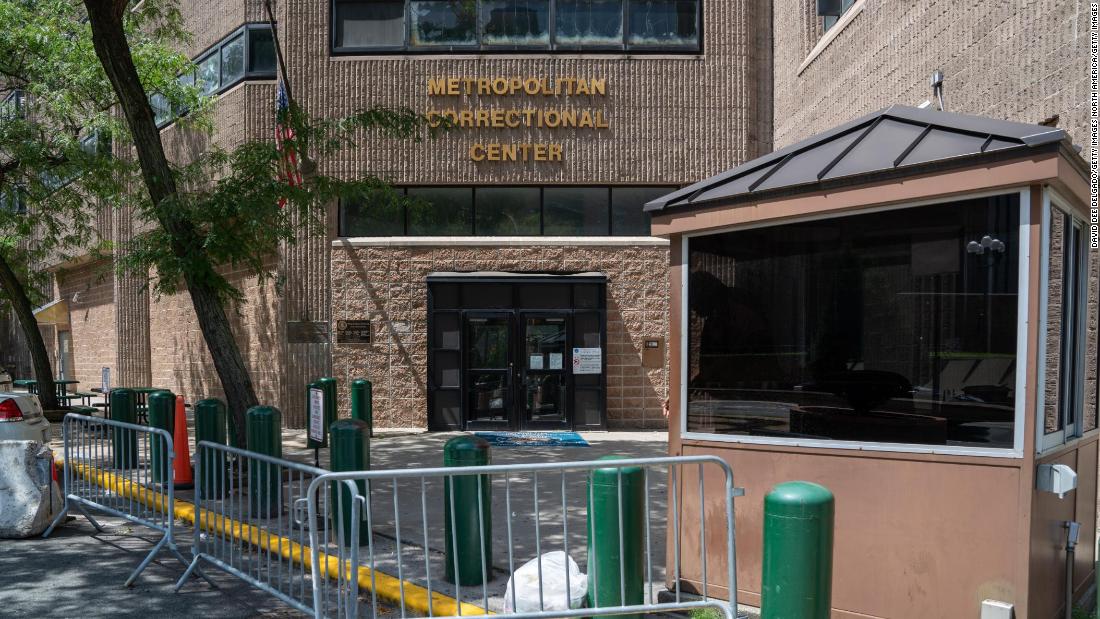[ad_1]
Epstein’s suicide has exposed what the employee union says are chronically overworked and short-staffed conditions at the Metropolitan Correction Center in Manhattan, including forced overtime and officers reassigned to guard duty.
A key US Senate committee has also repeatedly told the Justice Department to hire full-time correctional staff and end an “overreliance” on the type of reassignments that have existed in the MCC and elsewhere.
Two MCC guards were on duty and responsible for checking on Epstein every 30 minutes — checks that weren’t made for hours.
The FBI is investigating their actions and those of others at the MCC, according to people briefed on the matter.
Much is still not known about the confluence of a series of failures that led to the Epstein death.
Of the two officers who would have had responsibility to monitor Epstein, one is not currently a detention guard, but was temporarily reassigned to that post, according to a person briefed on the matter. The guard, a man not identified by officials, had previously been trained as a corrections officer but had moved to another position. BOP rules allow for people who work in other jobs, such as teachers and cooks, to be trained to fill in at posts usually manned by corrections officers.
The second guard on Epstein duty, a woman, was a fully trained corrections officer, according to the person briefed on the matter.
Eric Young, national president of the American Federation of Government Employees, Council of Prison Locals, which represents BOP employees, says a hiring freeze put in place at the start of President Donald Trump’s presidency is the root of nationwide problems at federal prisons.
He called the situation “dire,” with decreased staffing levels the root cause of issues from contraband getting in to safety of correctional workers and inmates.
AFGE represents workers at 122 facilities nationwide and BOP employs roughly 33,000, according to Young. That number was once at 38,000 workers but after the Trump hiring freeze, the problem was never fixed.
The Justice Department says Barr lifted the freeze in April and that BOP has been recruiting to fill positions. It typically takes months to bring on new federal employees.
“We felt betrayed,” Young said of the hiring freeze. “Mr. President, we work for you. You say you’re a law and order president and we thought we were going to reap the benefits of that, but we didn’t.”
In addition, more vacancies could soon be on the way; Young says an estimated 5,000 people are eligible for retirement at the end of the year.
The Justice Department declined to comment on the staffing issues.
Bonuses, augmentation
To combat the drop in workers, BOP officials have been offering a retention bonus, which gives workers a 5% bonus if they decide to stay instead of retiring, Young said. They also have allowed retired correctional officers to come back on a part-time basis to ease the staffing issues at hard-to-staff prisons, Young said. The agency also approved the addition of 3,000 temporary positions for entry level workers.
Officials also offered workers a 10% relocation bonus if they opted to work at facilities that are hard to staff like MCC in New York, Hazelton in West Virginia, the Metropolitan Detention Center in Los Angeles and others. Part of the relocation agreement is for staffers to stay at the facility for at least two years.
Young draws the correlation of fewer guards to safety, saying the problem came to a head early Saturday morning in New York.
“Time was not on our side before Epstein killed himself,” Young said. “We were on the right course of hiring but we just couldn’t do it fast enough. We were stalemated by Trump.”
The BOP has tried to address staffing shortages in part by using a practice called augmentation to temporarily assign employees who aren’t corrections officers to staff posts intended for detention guards.
“We cannot allow these dangerous staffing practices to continue,” the senators wrote.
They noted that twice when approving BOP’s budget, a Senate committee had issued a report that “included clear directions” to the Justice Department to stop “its overreliance on augmentation” in favor of hiring full-time correctional staff.
“The Committee again directs BOP to curtail its overreliance on augmentation, particularly in housing units” the committee’s report said. “BOP should instead hire additional full-time correctional staff before continuing to augment existing staff.”
Soon after Barr took office this year, he acknowledged to lawmakers that the Justice Department had “stumbled” in addressing the problem. In testimony before the Senate Appropriations Committee in April, he called the staffing shortages at prison facilities a “snafu” and blamed bureaucracy within the prison hiring system, not the hiring freeze.
“The shortages out in the prison facilities themselves was not the freeze,” Barr said. “I think what it is is, frankly, bureaucracy and I don’t say this in a bad sense, just the way these organizations go out bringing in people they leave much too much of a lead time.”
Barr said he believes the agency begins the process of hiring a new person into a position vacated by internal job shifts too late.
“It takes months and months and months to get that person on board. That makes no sense because every year we lose 2,600 of these correctional officers. So my view is we just have to turn on the spigot and keep these new entry level people coming in at a rate where we’re going to be able to get up to and maintain our enacted level,” Barr said.
“I think this is largely a snafu by the department and that’s how I interpret it and that’s how I’m approaching it,” he added.
[ad_2]
Source link


